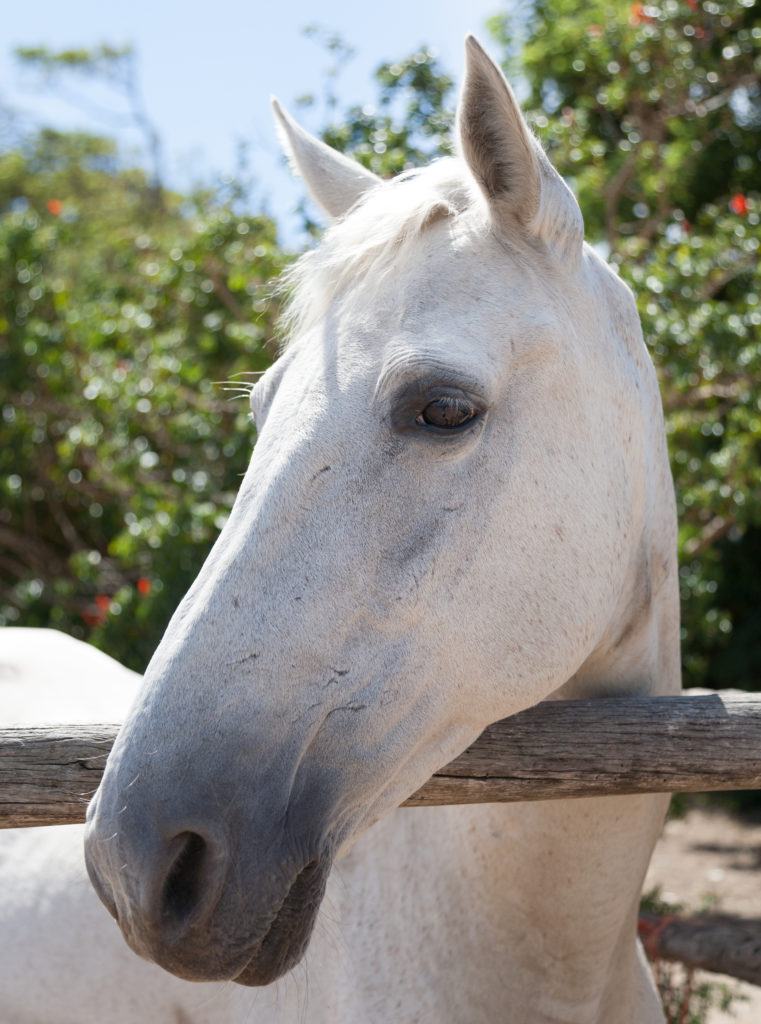There are many reasons that horses live longer these days than they did 100 years ago. For one thing, the workload placed on them has decreased substantially, as they are no longer a primary source of power and energy. In addition, the technology and available knowledge to provide care for them has improved. Now, horses commonly live upward of 25 years. In fact, horses are generally considered entering their “golden years” around the ages of 18 to 20. Every horse is different and some may be healthy their entire lives, while others may require more intensive care to keep healthy during their later years. However, there are some general considerations that should be taken into account when you are caring for old horses.
Problems with Caring for Old Horses

There are several problems that arise commonly with geriatric horses. One of the major issues with their health is the decreased ability of their bodies to absorb nutrients. This can render their regular diets insufficient, as well as cause their muscle tissue to break down over time. Old horses often have dental problems that result from a lifetime of using their teeth. In addition, these horses tend to be more easily impacted by stress. They are vulnerable to negative health conditions caused by changes in their environment, including the temperature or weather. Old horses also tend to be more vulnerable to many diseases than younger horses and their immune systems may not function quite as effectively. Due to these problems with caring for old horses, it is important to follow the appropriate steps to provide adequate care for them.
Vigorous Deworming
When a horse develops worms, their bodies are essentially fighting with the worms for the nutrients from their food. This further decreases the overall nutrient absorption of their body, which can be devastating for older horses. It is incredibly important to implement a vigorous deworming routine to prevent these issues from arising in old horses.
Good Nutrition
Because older horses have decreased nutrient absorption, it is crucial that they eat a nutrient-packed diet. Fresh green grass tends to be a great alternative to purely eating dry hay. This can also help to prevent blockages and help them stay hydrated. With older horses, it is beneficial to pay attention to what they are eating so that you can be confident that they are getting all of the nutrients that they need. You may also want to consider adding some supplements to their diet to provide adequate levels of nutrition. Consult with your veterinarian and consider adding a concentrated food source to their regular diet.
Check Hydration
Older horses tend to be extremely susceptible to impactions and colic, which can be deadly. It is extremely important to ensure that older horses remain hydrated to minimize the likelihood of these issues happening. You should check for signs of dehydration on a daily basis. Ensure that your horse is getting enough water and that they always have fresh, clean water available. Our Bar Bar A automatic watering system is a great way to ensure that an older horse always has clean water available to help them stay hydrated.
Provide Shelter
Older horses are particularly vulnerable to changes in the temperatures outside. Due to this, it is crucial to ensure that they have sufficient shelter available to them. This is important both in the hotter temperatures of the summer and the cold temperatures of the winter.
Hoof Care
Regular hoof care can help to keep your older horse comfortable over time. Old horses often experience joint pain and other issues, so taking care of their hooves will go a long way toward minimizing their discomfort. The appropriate hoof care can help to ensure that they are still able to get the regular exercise that they need to stay healthy.
Regular Exercise
Older horses tend to be less inclined to exercise as much as their younger counterparts. However, ensuring that they get regular exercise can go a long way toward keeping them healthy. Take care not to push them too hard, but still exercise them on a regular basis, unless otherwise directed by your veterinarian.
Frequent Checkups
There are many issues that old horses can develop over time. It is extremely beneficial to ensure that you bring them for checkups with your veterinarian on a regular basis. This can go a long way toward eliminating problems and catching potential issues in the early stages. Always follow your veterinarian’s recommendations when it comes to the health of your horse.
Signs of Aging
Understanding the signs of aging with your horse can help you to take the appropriate steps to care for them as they age. There are many common signs of aging in horses. Many horses will start to develop gray hairs on their face. Occasionally these gray hairs will spread through the coat, as well. Older horses tend to experience a decrease in skin elasticity. This can make it more difficult to detect dehydration, so ensure that you are checking for other signs of dehydration besides the skin test. Older horses often experience a decrease in the strength and definition of their muscles. Joint stiffness and an increased tendency to nap are additional signs of aging. Horses that are aging tend to more regularly experience gum and dental disease and they may exhibit weight loss or have difficulty maintaining their weight.
The appropriate steps for caring for old horses can go a long way toward keeping them healthy and combatting common problems that older horses experience. Keeping your older horses hydrated is incredibly important in reducing the risk of colic and many additional issues. You should check your older horses regularly for signs of dehydration and take the steps to rectify the situation. Pay attention to their diet and ensure that you bring them to visit the dentist on a regular basis. To learn more about the importance of hydration for older horses or how our automatic watering system can help to minimize the possibility of dehydration, contact us at the Horse Drinker today!

Leave a Reply